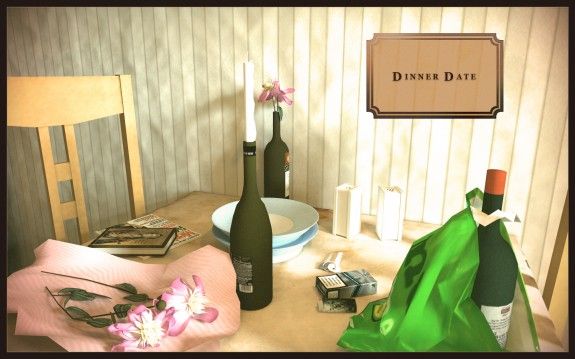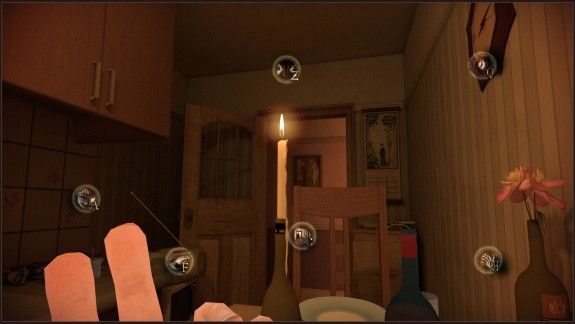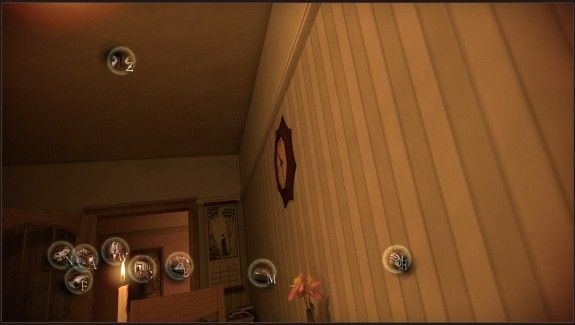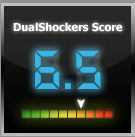I've just played Dinner Date for the fourth time, and I still don't know if it's a good game. Even after writing down the pros and cons, I'm not quite sure if I'm impressed, disappointed, or something inbetween. Hell, I don't even know if the term "game" applies to Dinner Date. What I do know, though, is that it's a fascinating high-concept videogame that has some massive potential, and should be explored accordingly.
Dinner Date isn't a traditional game by any means. The protagonist is Julian Luxemburg, a 20-something professional that waits idly by for his dinner date to arrive. You don't play as Julian, but rather as his subconscious as it tells Julian to commit certain acts as indicated on the screen. So instead of actively controlling Julian and making him walk around and interact, instead you can choose the ability to look at the clock, or look at the doorway, or impulsively tap your finger on the table. Through these actions, you get to hear Julian's thoughts as they go through a gamut of emotions that start off relatively calm, but can get quite elevated and insecure. It's with this that you come to know Julian as a person and sympathize with his situation.
That's perhaps the greatest strength of Dinner Date: by the end of the game we have a perfect understanding of who Julian is, and what he's about. The entirety of the game takes place in a tiny cramped kitchen in his flat, yet the thoughts running through his head paint a vast, colorful portrait of his life and the things that seem to affect him deeply. The subconscious thoughts really feel as if I'm reading the mind of someone waiting for a date to arrive; hearing Julian's concerns about his date, and then hearing his thoughts trail off into an unrelated aside about some prick at work is absolutely humanizing, and further gives the player a reason to connect and sympathize with him. Additionally, as odd as it is, making Julian incessantly tap his finger, or stretch every two minutes, or play with his food, is utterly satisfying on a personal, visceral level, and really makes it feel as if you yourself are Julian, waiting for a date.
Unfortunately, as quick as I got sucked in, I just as quickly found myself disliking his character for being such an insecure, neurotic, spineless protagonist. I completely understand that the fear of being stood up by a date can conjure up extremely insecure thoughts, thoughts that otherwise would never pop up in ones' head. I'd be lying if I said I haven't been in a situation like that. Even so, you'd think Julian would at least call the girl, or even give up on her after half an hour. Or, at the risk of turning this review into Loveline, if this really was something that Julian truly desired, he wouldn't be such a pussy about it and go out and find the girl in question himself. Perhaps I would have been more empathetic and felt a bit more raw emotion from the ending if Julian actually deserved to get the girl, but hearing all of his angst and self-esteem issues rubbed me the wrong way, and admittedly made me feel like I had little control of his thoughts.
Therein lies my biggest problem with the game: to call it a game might be a gross exaggeration. Sure, you're pressing buttons on your keyboard to make Julian look at certain things and fiddle with his hands, but really, none of those do anything to progress the story, which is just one linear path through Julian's thoughts, that always develops the same way. Julian will go through his script, and at key points, you'll be asked to do a specific action, like drink some wine, or look at the clock. Those actions never change, and all the actions you did between these key actions don't affect much of anything, if at all. To make sure of this, in my last playthrough I made sure not to do anything, no fiddling, no looking at the candle, no stretching, nothing. Sure enough, once Julian finishes his same old scripted thoughts, all the action prompts disappear except for the one action you're supposed to do. I ended up finishing the game by pressing only four buttons in total, and ended up with the exact same ending as the first, second, and third times I played. Essentially, it's just like an audiobook, where the only time you need to do anything is to switch out the CDs.
In any circumstance this would be unforgivable, but considering the game is only about half an hour long (and I'm being generous) and costs $12.95 to purchase, well, it's almost criminal. While I do understand that developers Stout Games are a pretty low-key business with a presumably low-key staff and low-key budget, if they had just been more ambitious and spent a little bit more time to craft multiple endings, more personalities, and a way to branch off from the one storyline, Dinner Date may have been something really special and completely worth the price. I definitely recognize the potential of the studio and commend Stout Games for such a high-concept premise, and I do think people should play it, as the dialogue and voice acting are quite good and the story may resonate with some. However, I don't know if I can recommend anyone actually buy Dinner Date, especially for the price of a movie ticket.
If there's a silver lining to this game, it's that Stout Games is now on the map for me. I'll be keeping a close eye on them in the future for sure.
- Title: Dinner Date
- Platform Reviewed: PC
- Developer: Stout Games
- Publisher: Stout Games
- MSRP: $12.95
- Release Date: November 17, 2010
- Review Copy Info: A copy of this game was provided to DualShockers, Inc. by the publisher for the purpose of this review.




